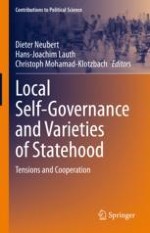The debate on governance originates in the OECD world. At the latest since the postcolonial debate, we know that we need to “test” our assumptions under radically different conditions. This book offers an extended perspective of local self-governance by examining cases from South Asia, Africa, and Latin America, together with a study of militias in the USA. The chapters present a wide variety of local actors who pursue different notions of order legitimized by local traditions based on hierarchy or deeply rooted communalism, Islamic theology, or grassroots democracy. Some local actors claim a state-like authority and challenge the territorial state. In such cases, there is no longer “a shadow hierarchy” but opposition to the state. Different violent actors fight for supremacy, and the state is just one actor among others. The empirical studies presented in this book show how different kinds of local self-governance are combined with varieties of statehood, and thus contribute to an understanding of the notion of governance in a fundamental sense that goes beyond the special case of the OECD world.
